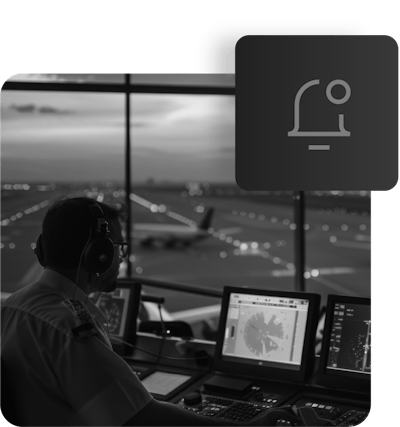Soar to new operational heights
Solve airport noise, carbon and environmental challenges across the aviation ecosystem with highly accurate noise monitoring and flight track data, community engagement and carbon calculation tools.



Trusted partner of 200+ airports around the globe





Complete solutions providing the best data for the job.
Revolutionise how your airport teams connect and collaborate with other airports, airlines, air navigation service providers, and communities. Our science-based technology, ISO-certified systems, top quality data and decades of aviation noise expertise underpin our innovation leadership.

Streamline reporting, strengthen community relationships and optimise capacity
Dynamic community engagement
Build trust and acceptance with communities by providing them with self-investigation portals and sharing operational data specific to their location with them in fit-for-purpose formats
Industry-leading compliance and reporting
Top quality data, ISO-certified systems and deep reporting and analytics empower airport teams to demonstrate compliance with confidence. High-volume complaint management tools ensure observations are responded to according to regulations.
Influence airspace efficiency
Collaborate with air navigation service providers to influence airspace modernisation initiatives to boost efficiency, reduce fuel consumption and carbon emissions, and manage noise while engaging with communities.
Learn about Carbon Emissions
The world’s most advanced environmental intelligence platform for airports
Our industry-leading innovative technology gives you the tools to monitor, model, report and proactively solve complex environmental and community challenges at your airport in collaboration with ecosystem partners.

Cutting-edge noise and operations management platforms
Go beyond standard noise monitoring with a solution that connects directly to your airport’s radar and flight systems. Get a complete picture of noise exposure and compliance with powerful insights from your monitoring network.

Track compliance with and effectiveness of noise reduction procedures
Understand how well airlines are complying with flight operating procedures and what the resulting noise impacts are to communities, improving engagement with key stakeholder groups.

Automated, real-time reporting and transparency
Instantly generate detailed reports for regulators and community stakeholders—proving responsibility and compliance. We work with hundreds of airports with varying levels of environmental constraints, providing fit-for-purpose solutions that match the complexity of the challenges each airport is managing.

Next-level community engagement tools
Our innovative solutions enable airports of all sizes to work with communities proactively, ranging from general data to tailor-made content.
24/7 airport noise monitoring systems
Range of solutions for community engagement
Highly accurate stakeholder reporting
Calculate aircraft GHG emissions across every phase of flight

“The project has benefited from our long relationship with Envirosuite. It was delivered in a way that allowed us to maintain our monitoring and reporting capabilities while providing opportunities for users to fully understand the system.”
Tim Walmsley, Environmental Manager, Manchester Airport
Thinking, Research and News
Blog
The road to proactive air quality management at airports today
Whitepaper
Exploring the Aviation industry in the 'new era'
Blog
‘Net Zero’ is dominating the spotlight today, but what does it really mean for Aviation?
News
Aena deploys InsightFull at Barcelona Airport to support transparent communication around airport noise management
Manage noise.
Keep communities onside.
Drive improvements through quality data and science-based insights. Let’s chat or schedule a demo.